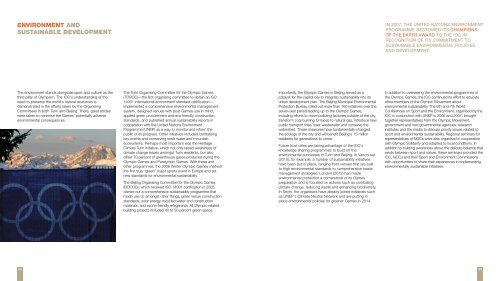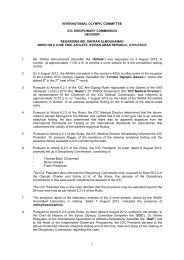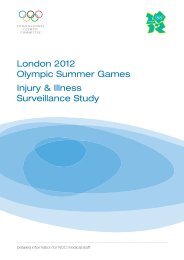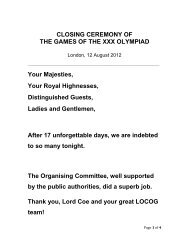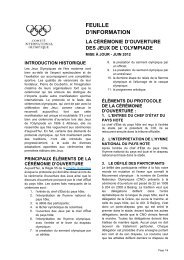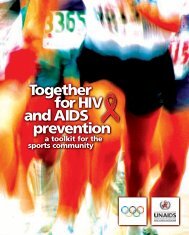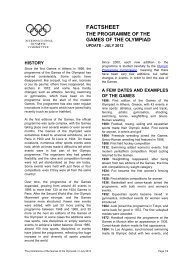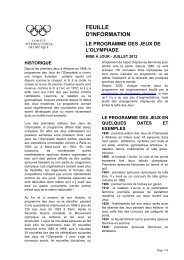3912 reportcomplete final web:layout 1
3912 reportcomplete final web:layout 1
3912 reportcomplete final web:layout 1
You also want an ePaper? Increase the reach of your titles
YUMPU automatically turns print PDFs into web optimized ePapers that Google loves.
ENVIRONMENT AND<br />
SUSTAINABLE DEVELOPMENT<br />
The environment stands alongside sport and culture as the<br />
third pillar of Olympism. The IOC’s understanding of the<br />
need to preserve the world’s natural resources is<br />
demonstrated in the efforts taken by the Organising<br />
Committees in both Turin and Beijing. There, great strides<br />
were taken to minimise the Games’ potentially adverse<br />
environmental consequences.<br />
The Turin Organising Committee for the Olympic Games<br />
(TOROC)—the first organising committee to obtain an ISO<br />
14001 international environment standard certification—<br />
implemented a comprehensive environmental management<br />
system, designed venues with post-Games use in mind,<br />
applied green procurement and eco-friendly construction<br />
standards, and published annual sustainability reports in<br />
cooperation with the United Nations Environment<br />
Programme (UNEP) as a way to monitor and inform the<br />
public of its progress. Other initiatives included centralising<br />
key events and conserving fresh water and mountain<br />
ecosystems. Perhaps most important was the Heritage<br />
Climate Turin initiative, which not only raised awareness of<br />
climate change issues amongst Turin residents, but also<br />
offset 70 percent of greenhouse gases produced during the<br />
Olympic Games and Paralympic Games. With these and<br />
other programmes, the 2006 Winter Olympic Games marked<br />
the first truly “green” major sports event in Europe and set<br />
new standards for environmental sustainability.<br />
The Beijing Organising Committee for the Olympic Games<br />
(BOCOG), which received ISO 14001 certification in 2005,<br />
carried out a comprehensive sustainability programme that<br />
made use of, amongst other things, green venue construction<br />
standards, solar energy, recycled water and construction<br />
materials, and ozone-friendly refrigerants. All Olympic-related<br />
building projects included 40 to 50 percent green space.<br />
Importantly, the Olympic Games in Beijing served as a<br />
catalyst for the capital city to integrate sustainability into its<br />
urban development plan. The Beijing Municipal Environmental<br />
Protection Bureau rolled out more than 160 initiatives over the<br />
seven-year period leading up to the Olympic Games,<br />
including efforts to move polluting factories outside of the city,<br />
transform coal-burning furnaces to natural gas, introduce new<br />
public transport lines, treat wastewater and conserve the<br />
watershed. These measures have fundamentally changed<br />
the ecology of the city and will benefit Beijing’s 15 million<br />
residents for generations to come.<br />
Future host cities are taking advantage of the IOC’s<br />
knowledge sharing programmes to build on the<br />
environmental successes in Turin and Beijing. In Vancouver<br />
(2010), for example, a number of sustainability initiatives<br />
have been put in place, ranging from venues that are built<br />
to high environmental standards to comprehensive waste<br />
management strategies. London (2012) has made<br />
environmental protection a cornerstone of its Games<br />
preparation and is focused on actions such as combating<br />
climate change, reducing waste and enhancing biodiversity.<br />
In Sochi, the organisers have already joined initiatives such<br />
as UNEP’s Climate Neutral Network and are putting in<br />
place environmental policies for greener Games in 2014.<br />
IN 2007, THE UNITED NATIONS ENVIRONMENT<br />
PROGRAMME BESTOWED ITS CHAMPIONS<br />
OF THE EARTH AWARD TO THE IOC IN<br />
RECOGNITION OF ITS COMMITMENT TO<br />
SUSTAINABLE ENVIRONMENTAL POLICIES<br />
AND DEVELOPMENT.<br />
In addition to overseeing the environmental programmes of<br />
the Olympic Games, the IOC continued its effort to educate<br />
other members of the Olympic Movement about<br />
environmental sustainability. The 6th and 7th World<br />
Conferences on Sport and the Environment, organised by the<br />
IOC in conjunction with UNEP in 2005 and 2007, brought<br />
together representatives from the Olympic Movement,<br />
government and non-governmental agencies, research<br />
institutes and the media to discuss priority issues related to<br />
sport and environmental sustainability. Regional seminars for<br />
representatives of NOCs were also organised in cooperation<br />
with Olympic Solidarity and adapted to local conditions. In<br />
addition to building awareness about the delicate balance that<br />
exists between sport and nature, these seminars provided the<br />
IOC, NOCs and their Sport and Environment Commissions<br />
with opportunities to share their experiences in implementing<br />
environmentally sustainable initiatives.<br />
52<br />
53


